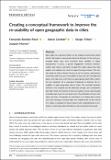Files in this item
Creating a conceptual framework to improve the re-usability of open geographic data in cities
Item metadata
| dc.contributor.author | Benitez-Paez, Fernando | |
| dc.contributor.author | Comber, Alexis | |
| dc.contributor.author | Trilles, Sergio | |
| dc.contributor.author | Huerta, Joaquin | |
| dc.date.accessioned | 2019-11-26T12:30:11Z | |
| dc.date.available | 2019-11-26T12:30:11Z | |
| dc.date.issued | 2018-08-17 | |
| dc.identifier | 263618140 | |
| dc.identifier | 448abacc-0c72-4e25-a703-48d734a0dd04 | |
| dc.identifier | 000441969400011 | |
| dc.identifier | 85051562351 | |
| dc.identifier.citation | Benitez-Paez , F , Comber , A , Trilles , S & Huerta , J 2018 , ' Creating a conceptual framework to improve the re-usability of open geographic data in cities ' , Transactions in GIS , vol. 22 , no. 3 , pp. 806-822 . https://doi.org/10.1111/tgis.12449 | en |
| dc.identifier.issn | 1361-1682 | |
| dc.identifier.other | ORCID: /0000-0002-9884-6471/work/65345567 | |
| dc.identifier.uri | https://hdl.handle.net/10023/19006 | |
| dc.description | The authors of this research gratefully acknowledge funding from the European Commission within the Marie Skłodowska‐Curie Actions, International Training Networks (ITN), and European Joint Doctorates (EJD). The funding period is January 1, 2015–December 31, 2018, Grant Agreement No. 642332 – GEO‐C – H2020‐MSCA‐ITN‐2014. Sergio Trilles has been funded by the postdoctoral program Vali + d (GVA) (Grant No. APOSTD/2016/058). | en |
| dc.description.abstract | Open data has a profound effect on the working environment within which information is created and shared at all levels. At the local government level, open data initiatives have resulted in higher transparency in policy, a greater engagement between decision-makers and citizens, and have changed the culture about how data analysis and evidence are used to support local governance. This article, based on data collected through an on-line survey, participatory workshops with data user communities in four cities (in Colombia and Spain), and interviews with Valencia good-government office, identifies four elements for a conceptual framework to improve the re-usability of open geographic data in cities. The essential elements defined in this research are the definition of data user communities and their needs, the creation of the community of reuse, user-focused metadata, and reuse-focused legal terms. The definition of these indicators provides a framework for authorities to re-shape their current open data strategy to include data user requirements. At the end of this article, a roadmap for future research and implementation is presented, considering some reflections on the conceptual framework. | |
| dc.format.extent | 17 | |
| dc.format.extent | 1670551 | |
| dc.language.iso | eng | |
| dc.relation.ispartof | Transactions in GIS | en |
| dc.subject | Open data ecosystem | en |
| dc.subject | Government data | en |
| dc.subject | Impact | en |
| dc.subject | Models | en |
| dc.subject | G Geography (General) | en |
| dc.subject | ZA4050 Electronic information resources | en |
| dc.subject | 3rd-DAS | en |
| dc.subject | SDG 11 - Sustainable Cities and Communities | en |
| dc.subject.lcc | G1 | en |
| dc.subject.lcc | ZA4050 | en |
| dc.title | Creating a conceptual framework to improve the re-usability of open geographic data in cities | en |
| dc.type | Journal article | en |
| dc.contributor.institution | University of St Andrews. School of Geography & Sustainable Development | en |
| dc.identifier.doi | https://doi.org/10.1111/tgis.12449 | |
| dc.description.status | Peer reviewed | en |
This item appears in the following Collection(s)
Items in the St Andrews Research Repository are protected by copyright, with all rights reserved, unless otherwise indicated.

